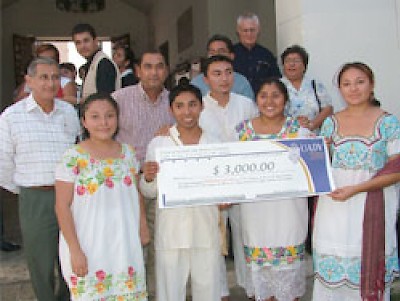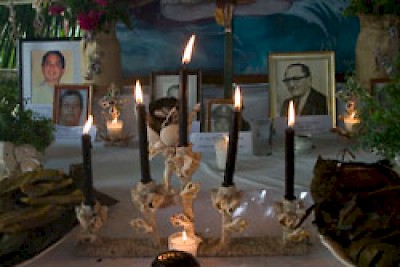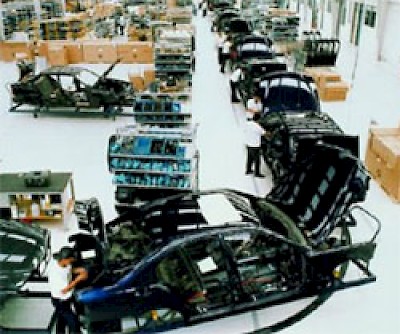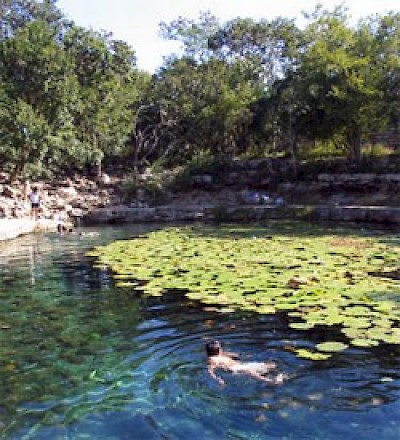Yucatan News: Mexican economy, weather & winners
UADY’s 9th Contest of Altars: And the Winners Are….
First Place: Veterinary Medicine and Zootecnia $3,000 MXP
Second Place: Odontology $2,000 MXP
Third Place: Accounting and Office Administration $1,500 MXP
Honorable Mention: Medicine $1,500
The goal of this contest is to preserve the culture and traditions of Yucatan, which these young people accomplish with exceptional skill. If you will be visiting Yucatan during this traditional holiday next year, or if you will be having company from home, please be sure to have the 10th Contest of Altars at UADY on your “must see” calendar. Congratulations to all of the winners of UADY’s 9th Contest of Altars!
Catching Up With MEL
It is good to see the “You’ve Got MEL” newest update! For those of you who are not members of the Merida English Library, you can still have access to the newsletter, which is always listed at the top of MEL’s Resources Page. This month, you need to remember that the membership fees are going up on January 1, to $350 MXP for families, $250 MXP for individuals, and $100 MXP for students. You also need to remember that, due to limitations of space, you need to register now if you want to participate in the 2009 Chili Cook Off. The Women’s Book Club is currently reading Folly by Barbara Kingsolver. In December, they will be reading Revolution of Hope by Vicente Fox. For much much more, do go to the MEL website and download You’ve Got MEL.
Valladolid: Presentation of the Altars of Hanal Pixán
For the past few years, the presentation of the Altars of Hanal Pixán at UADY has grown to the point that there are approximately 200 entries in a contest with quite handsome cash prizes. In addition, the Plaza Grande and surrounding streets and parks are all filled with altars from all over the state. Tourists love these expositions/contests and that fact has not been lost on the City of Valladolid, but with a little bit of a twist. Because of all the tourism generated by Chichen Itza, and because it is often easier for tourists to come to Valladolid from Cancun than for them to come all the way to Merida, the students of the Languages Department of the University of Valladolid are now functioning as tour guides and explaining the meaning of Hanal Pixán in Mayan, English, French, and Spanish. This is just the latest in a long line of tourism-related projects by that particular group of language students. Look for great things from all of them as they bring their language skills into the 21st century in Yucatan! Altars are also on display in schools in Uman, Motul, Hunucma, and Izamal, as well as many other municipalities, so look for growing exhibitions and contests all over the state next year.
U.S Economic Downturn May Be Coming to Mexico
There is speculation that the wave of U.S. plant closings, with resultant job losses and losses in spending power, will soon decrease demand for credit, durable goods, and automobiles. Those who have watched as the economies of all of the North American nations have become more and more dependent on each other will not be surprised to see that at least some of this economic downturn will bleed across the border and affect our manufacturing plants. There is now speculation that Mexico could lose as many as a million jobs a year if this crisis continues. In the State of Quintana Roo, there have already been up to 1,300 permanent job losses. So far, we have not felt much in Yucatan, but that is not to say that it can’t happen here, especially since so many now depend on tourism for the major part of their income. Yucatan is still the “best bet” for both travel and living so, even if we escape the worst of it, we must still think of those who need help in other places.
Whirlpool Closing 2 Plants in Mexico
>
This is a misleading title – as if those are the only 2 plants Whirlpool is closing and as if Whirlpool is in trouble. Not so. In the first place, Whirlpool is closing 4 plants – 2 in Mexico and 2 in the U.S. They have many other manufacturing plants in both countries, so it isn’t as if they are abandoning either the U.S. or Mexico. In the second place, Whirlpool is active all over Europe, Asia, and Central and South America. While the 2,000 jobs lost in these 4 plants mean a lot to the people who lost them, they are little more than a blip on the radar for this worldwide, successful company. Now that we are in a global economy, it is prudent for all of us to look these companies up on the web and learn far more about what they are doing and where. Our economic futures could depend on understanding the global marketplace.
New Manufacturing Jobs Still Opening Up in Mexico
Everybody who needs automotive parts and accessories does not live in the U.S. The markets in Asia, and Central and South America are still buying, which prompted the recent opening of Hella KGaA Hueck & Co. about 150 miles north of Mexico City. Hella is the largest aftermarket manufacturer in automotive parts and accessories in the world and is already responsible for some 2,000 jobs in Mexico. This plant has added another 100 to that figure.
Smoke Free School in Motul
And so it begins… the Instituto Tecnológico Superior de Motul has been certified as a smoke-free school, the first to earn this designation in Yucatan. At the present time, about 26% of the population of Yucatan are smokers but, realizing that the next generation can be protected from the effects of tobacco, Yucatecos have steadily moved forward with efforts to end smoking in restaurants, schools, and other public buildings. There are still smoking and non-smoking areas in most of these places, so smokers are not treated to the rabid ostracism they face in other nations; but they are encouraged to keep smoke away from those who have chosen to abstain. Congratulations to the Instituto Tecnológico Superior de Motul for being the first certified smoke-free school in our state.
UADY Wants to Remain Free
The struggles faced by post-secondary education everywhere have come to Yucatan. Large state educational institutions find it difficult to survive, especially in the areas of research, without federal support. Yet, federal support (no matter the nation) always comes with strings attached. UADY has a double burden to carry. Not only must they be a flagship educational institution for the nation, but they must also serve the Mayan community in the interior of our state. Serving the people of Yucatan is not an option and, through mediation, UADY is working hard to make their situation understood. If they go too far toward associations with other institutions, there is the potential for cultural weakening in all interior communities. We feel certain this issue will be resolved in the near future and UADY can return to the task of bringing post-secondary community colleges to communities throughout Yucatan. Yucatecos are, after all, a nation of people with a history of seeking knowledge and education.
Mexico: 25% Renewable Energy by 2012
This past week, UADY hosted the 32nd Annual Week of Solar Energy Conference. The new President of the National Association of Solar Energy (ANES), Ernestina Torres Reyes, assumed her office in a ceremony held at Teatro Peon Contreras. Research scientists have been working on the issue of renewable energy in Mexico since 1976. Today, there are at least 650 research studies underway, with findings showing that, if political policy can catch up with the science, 25% of Mexico’s energy production can come from renewable sources by the year 2012. The pressure is on now and there is no reason to believe that this cannot happen. We congratulate Ernestina Torres Reyes on her new office and wish, for her and for Mexico, all the success necessary to make these dreams a reality. Visit the ANES Website here.
Police Give Safety Talks to Children in Chicxulub
The police in Chicxulub have begun a series of talks on road and home safety in Chicxulub. These talks instruct children on everything from how to safely cross the street to keeping the doors locked when home alone. This type of interaction between the police and children will certainly result in a safer and healthier life for the children, but it will also form a relationship between the policemen and the children that might make it easier for them to work together in the future. These types of police activities have a value that goes far beyond one or two lessons in safety and all of us are the beneficiaries of a better, and safer, community because of it. Our thanks to all of the police departments that are participating in such programs, and to the children who take the classes.
Tizimin: 305 Free Homes for Police
Just weeks ago, the Federal Government of Mexico announced a program in which free homes would be given to policemen as an inducement to end corruption. This was most welcome news in Yucatan, where it is often not possible for smaller rural municipalities to even help policemen with the purchase of uniforms and shoes. Practically before the check cleared the bank, 305 free homes for policemen were underway in Tizimin, with more to be built. We congratulate the policemen and their families on a job well done, often at the cost of comfort for their families. May they all have better days ahead.
Cold: Inconvenient for Us; Deadly for Bees and Children
>
This past week, overnight temperatures fell to 12.8 °C (55 °F) in Merida and to 10 °C (50 °F) in the southern part of the state. As you can well imagine, out came the coats, sweaters, hats, and blankets. Children on the way to school are bundled up as if there is a blizzard outside and babies get lost among the blankets in strollers. In the southern part of the state, school absenteeism, due to cough and asthma, is high because children who live in traditional housing must depend on smoke-producing fires for warmth. For those Snowbirds who have not yet begun their annual trip, don’t forget your electric blankets. For those who have never spent the winter here, imagine waking up in a hammock – in a concrete house – with a tile floor – and its been 50 degrees outside long enough to turn it all into a refrigerator. It doesn’t last long, but it certainly is an “experience.” Cold weather is also no laughing matter to beekeepers. Cold weather means fewer food sources for bees and there is the very real possibility that they will starve if not fed with sugar. This is driving the price of honey up at a time when transportation costs, worldwide, are also rising. Please keep our beekeepers in mind as they attempt to keep their bees alive through the winter, as well as the children in rural areas as they struggle to get to school and stay as healthy as possible.
For Children & Teens: Shelters and Feeding Programs
Retirement is loads of fun – but… after about 2 weeks, “vacation” tends to get a little boring and we start looking around for something to do. Expats founded and now volunteer at La Virgen de la Asunción Food Bank in Chicxulub and most of us (we hope) support the Apoyo Program for Students in Progreso, and still the need in the southern part of our state continues to grow. At the present time, Yucatan is operating 35 shelters and 3 more “dining halls” to serve 1,796 children and teens throughout the state. These children, for the most part, are not orphans. Their families simply do not have the financial resources to care for them and there is no foster parent program in Mexico. Under the direction of the National Commission for the Development of the Indigenous Towns, several municipalities will have access to a new shelter in Peto. The goal of the shelter is to provide safe, suitable, and worthy lodging to children. The new shelters, as they are built throughout the state, will fortify cultural identity, promote recreation, and support education and health care for the children who live there. The new shelters will consist of dormitories, auditoriums, classrooms, kitchens and dining rooms, baths, and sports fields. While we congratulate the municipalities and children who are the beneficiaries of all of these programs, we also would like to challenge the expat community to look for more ways we can be of service to the people who have been so welcoming to us.
Yucatan’s Cenotes To Be On Discovery Channel
A documentary has been made of the cenotes in our state. It will air November 14 – 17 on the Discovery Channel as part of the Historia del Espeleobuceo en Yucatán (History of Spelunking in Yucatan). This is part of a joint program of environmental concern and activism between Mexico, the U.S., and Argentina. At the present time, Yucatan is working hard to bring cenote diving into mainstream tourism by making the cenotes easier to get to, safer, and even accessible for those who are disabled. This television production will focus attention on Yucatan throughout the world. Our only cautionary advice is a plea for visitors to consider the health of the magical world of the cenotes, as they dive, by not wearing such things as sunscreen into the water and by making sure that the area is as pristine when they leave as when they arrive. This will protect the health of our cenotes which are, after all, part of the only water system we have in this state. Congratulations to everyone who has worked on this product and welcome to those who travel here to see it.














Comments
GEORGE 16 years ago
I am deeply in love with every single piece of information you post here. Will be back often to read more updates!
Reply
CasiYucateco 17 years ago
Solar hot water would be such a natural energy saving method in Yucatan. So would wind farms in the shallow coastline waters. The regular daily and night sea- and land-breezes are perfect.
Reply
Harald Jezek 17 years ago
Brenda,
there actually is a system like that on the market.
It consits of copper piping placed in the sun on the roof. Water cycles through the piping gets heated (copper is an excellent conductor for heat) and is collected in a insulated storage tank.
It's not th sophisticated solar energy with solar panels but it works fairly good. I'm running my house on that system and I (almost) always have at least lukewarm water. Even in the morning after cold night like the past ones.
The system is pretty cheap too. As far as I remember I paid about 12000 pesos for it.
Reply
Brenda Thornton 17 years ago
That much by 2012 sounds daunting. When I read an article written by the working gringa on the tenacas? or rooftop water cisterns becoming quite hot if they are not sheltered, I wondered if one could not utilize passive solar heating of the water by having two of them, one which would be open to heating by the sun, and route that through the hotwater heater, which would decrease the heating required, at least during the day, and another sheltered one for general use.
Reply
Ben C 17 years ago
25% renewable energy by 2012 would be an amazing accomplishment.
It should get a lot easier as PV technology increases and the prices decrease. Good Luck!
Reply
(0 to 5 comments)